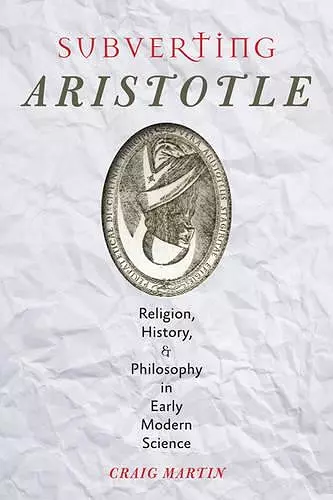Subverting Aristotle
Religion, History, and Philosophy in Early Modern Science
Format:Hardback
Publisher:Johns Hopkins University Press
Published:2nd May '14
Currently unavailable, and unfortunately no date known when it will be back

Craig Martin's Subverting Aristotle explores the decline of Aristotelian philosophy and its complex relationship with Christian thought during the scientific revolution.
In Subverting Aristotle, Craig Martin presents a compelling examination of the intricate relationship between Aristotelian philosophy and Christian thought from the eleventh to the eighteenth century. The book delves into how medieval theologians reconciled Aristotelian natural philosophy with Christian dogma, creating a synthesis that dominated religious thought for centuries. However, this synthesis began to unravel in the seventeenth century, coinciding with the rise of new natural philosophies during the scientific revolution. Martin's analysis highlights the pivotal moments when Aristotelianism's authority waned, revealing the complexities of this historical transition.
The author meticulously traces the decline of Aristotelianism, emphasizing the religious polemics that accompanied the scientific controversies of the time. While many scholars have focused on the new sciences that challenged Aristotle's views, Subverting Aristotle uniquely highlights the theological debates that played a crucial role in this intellectual shift. Martin draws on a wealth of primary sources from various European regions, providing a comprehensive perspective on the topic.
Written in clear and precise prose, Martin's work is poised to become a standard reference for scholars and students alike. The book not only reshapes current understandings of the scientific revolution but also reevaluates the impact of Renaissance humanism on the development of modern thought. Subverting Aristotle will undoubtedly be essential reading for those interested in the intersections of philosophy, science, and religion.
Academic and exuberant, the text provides a useful counter-reading of commonly held assumptions about the displacement of Aristotelian thought at the advent of the scientific revolution. Choice Refreshingly clear and readable... A good introduction to Aristotelianism. Renaissance Quarterly Concise but very richly informative, Martin's book with its clear vision and narrative will surely remain an essential work on the history of Aristotelianism for years to come. Isis ... [ Subverting Aristotle] effectively demonstrates the impossibility of completely disentangling the history of premodern philosophy from the history of premodern science, and the value of bridging the medieval and early modern periods even when endeavoring to account for the distinctiveness of the 'new sciences' of the later seventeenth century. The British Journal for the History of Science Reading the wildly varying portrayals of Aristotle's relationship to religion, from virtual Christian to benighted atheist, which Martin has collected together in this rich study, one cannot but agree with the French Jesuit Rene Rapin that "it is difficult to understand how in the succession of time it has been possible to make such different judgments on the same person" (p.167). The Catholic Historical Review [Subverting Aristotle] offers a lot of very useful and fine-grained research into the shifting fortunes of late-medieval and early-modern Scholasticism. British Society for Literature and Science ... excellent contribution Common Knowledge ... lucid and fascinating... Martin's book offers a necessary tonic to those texts that merely hold up religion as the adversary of science without explaining why. Sun News Miami
ISBN: 9781421413167
Dimensions: 229mm x 152mm x 23mm
Weight: 499g
272 pages